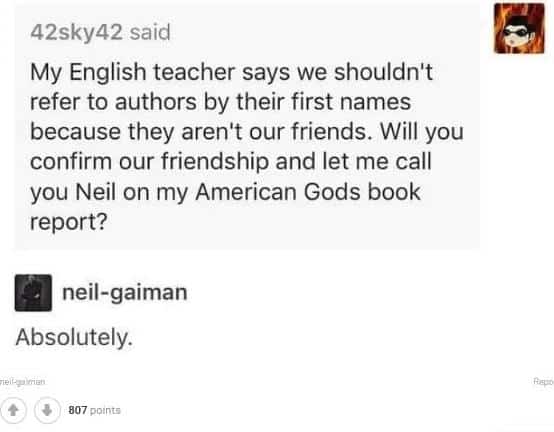The problem with this English teacher is they presumed to know something they do not.

I don’t know a single author who would’ve responded differently to this student’s request.
Also, the teacher assigned a book report? Those dreadful things still exist? I once wrote an essay in high school entitled, “Thanks for ruining this great book by making me write a stupid book report.” To his credit, the teacher thought it was very funny.
Sadly, I was still required to write the book report.
All of this reminds me of Bruce McAllister, a sixteen-year-old high school student who, in 1963, sent a four-question mimeographed survey to 150 well-known authors of literary, commercial, and science fiction.
McAllister wanted to know if authors consciously planted symbols in their work.
It turns out that many of the authors put absolutely no thought into symbolism when writing their stories (myself included), even though English teachers and professors assumed otherwise and taught their books as if symbolism was a tool that the authors intentionally deployed.
This is a problem in many fields:
If you don’t engage in the craft, it’s hard to understand the craft.
I see this all the time. Teachers at almost any grade level, for example, teach their students how to write even though they are not writers themselves.
This is not to say that teachers need to become professional writers or published authors. They just need to be writers:
People who write fiction, poetry, memoir, essay, and the like on at least an occasional basis.
But instead of engaging meaningfully in the craft, teachers often teach their students by simply imagining what actual writers do or by using lessons in a curriculum often designed by people who only write lessons about teaching writing but do not actually write those things themselves.
See the problem?
If you want to teach writing, write. Write at least as often as you ask your students to write. Very quickly. you will discover what your students are experiencing and become a much more helpful and effective teacher.
The same goes for many things.
I have worked with directors on stories who have never actually told a story onstage before.
Not only can’t they understand the challenges of performing in front of hundreds of people, but they somehow think that they can understand storytelling from the sidelines. They think that analyzing and critiquing stories from the cheap seats somehow allows them to understand the rhythms, flow, cadences, and nuances of crafting a story for a live audience.
Unless you’ve actually performed onstage (and unless you are at least occasionally still performing onstage), you can’t hope to imagine the feel of a lengthy pause. You can’t begin to calculate the mathematics behind humor. You have no way of understanding the impact of an unexpected laugh, the internal panic of losing your place, or the tonality used to signal a shift in tone, location, time to an audience.
Still, some try. Instead, they could simply take the stage at an open mic and learn. They need not become a champion storyteller nor make it an every-day thing, but become a storyteller. Take the stage – any stage – three or four times per year, and do they thing that you presume to be able to teach.
Teach from experience.
I understand that this isn’t always possible.
A coach who has never played organized football because he couldn’t make a team can still learn to become an effective coach over time, but he will never really understand what it’s like to fight in the trenches. There are still aspects of the game that he will never comprehend.
But the barrier for many of these things are not especially difficult. The bar is low.
If you’re teaching writing, there is no excuse not to be writing yourself.
If you’re directing stories, there is no excuse for not stepping on stage every now and then at an open mic and telling a story yourself.
Would you want your child to learn piano from someone who has never played?
Would you take golf lessons from someone who doesn’t play the game?
Would Bob Ross have been equally trusted had he not been painting along with his viewers?
If you want to help someone with their craft, engage in the craft. Do the thing that you’re trying to teach.
And if you’ve been assigned a book report on any one of my novels, you can inform your teacher that Matt doesn’t approve.
And yes, you can use my first name.









